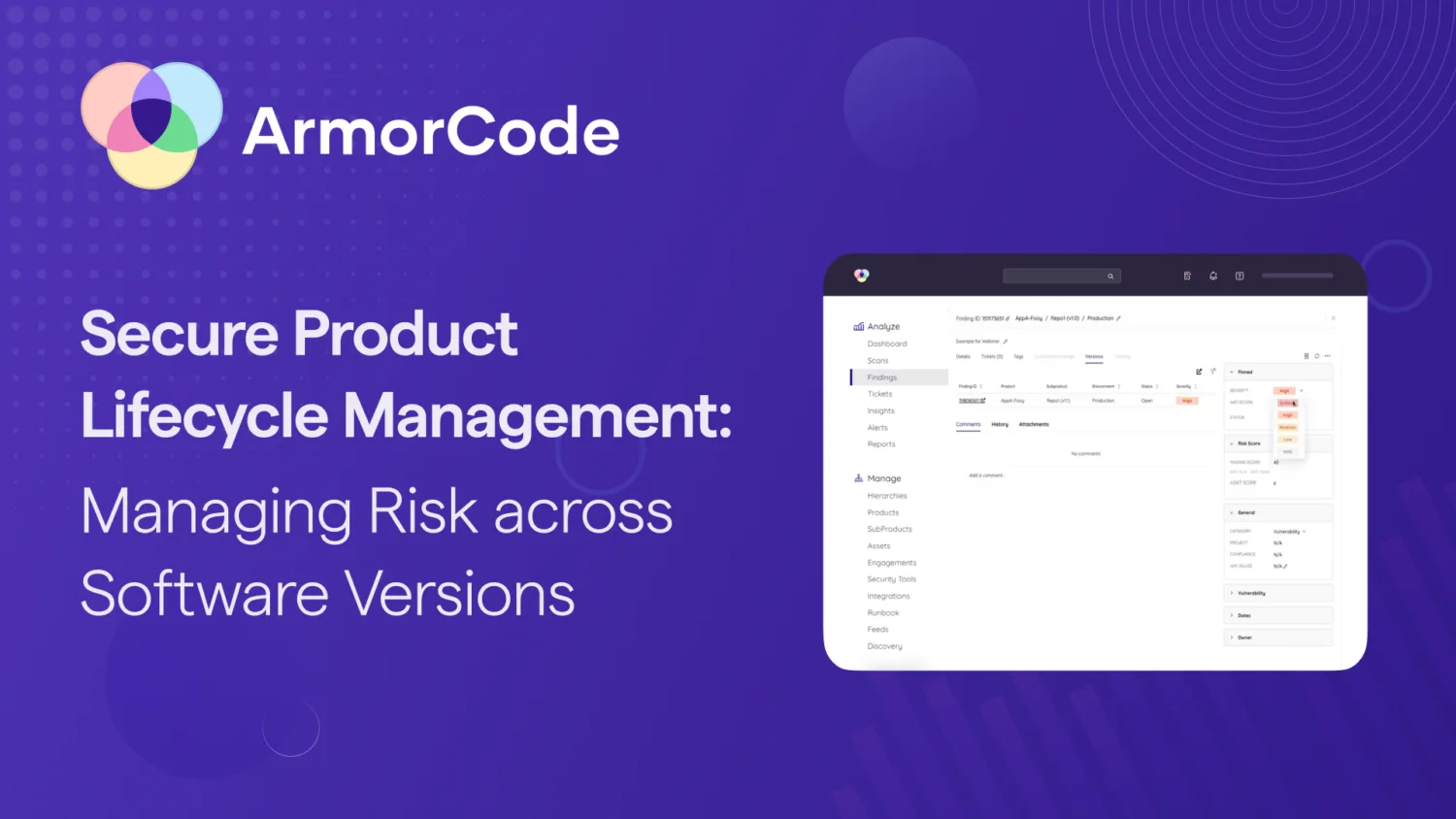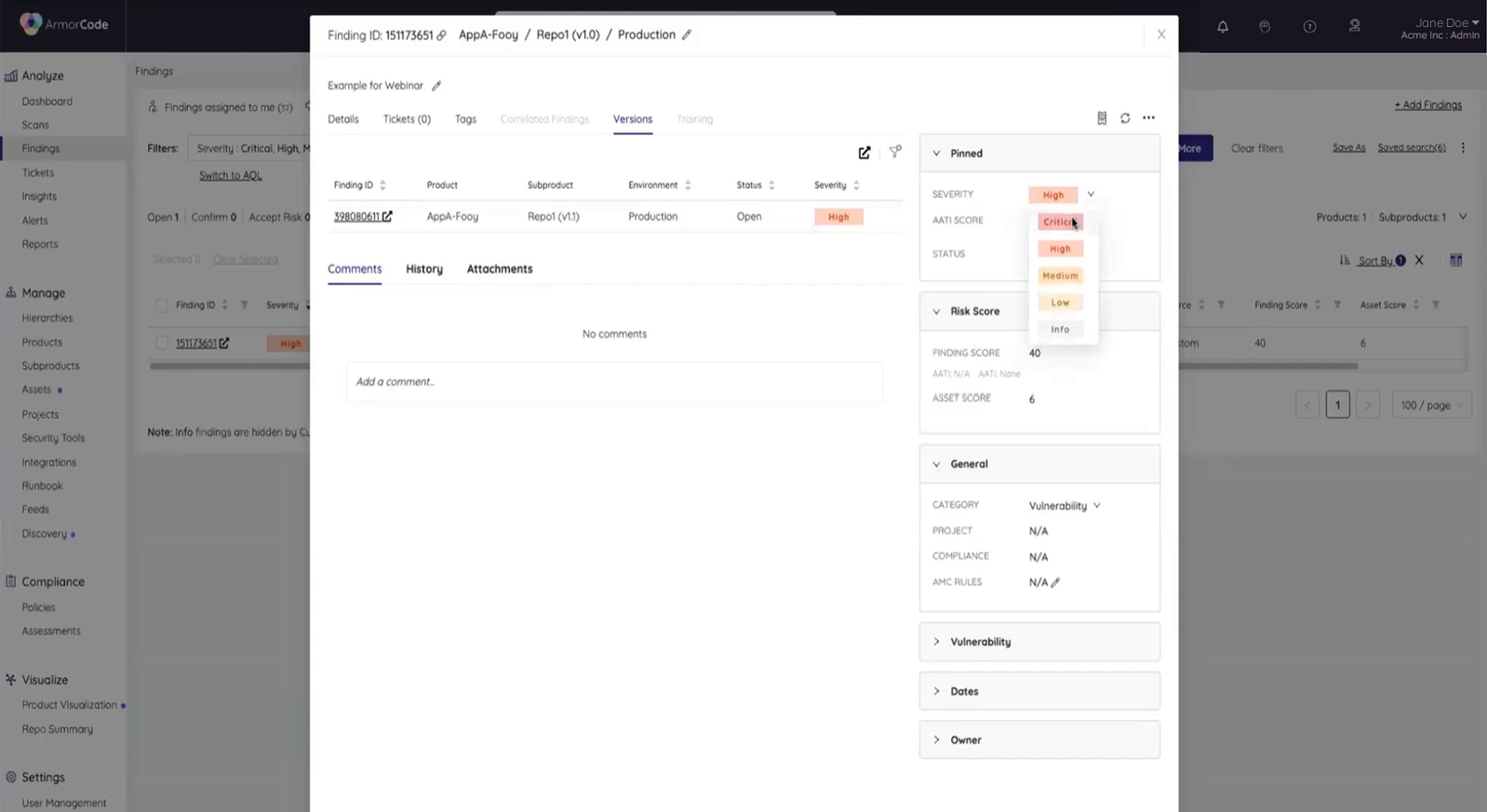Managing Risk with Secure Product Lifecycle Management

Managing risk and securing tens or hundreds of software releases deployed on customers’ infrastructure is a complex challenge. Product Lifecycle Management with ArmorCode empowers product security teams to manage security findings across all software versions at speed and scale. This provides visibility into where issues are introduced, exist, and persist ultimately facilitating risk assessments and remediation prioritization.

What is Secure Software Product Lifecycle Management?
Secure Software Product Lifecycle Management (SSPLM) is a holistic approach integrating security measures and practices into the entire software development lifecycle. It aims to address security concerns at every phase of a product’s lifecycle, from design and development to deployment and end-of-life. Ideally, this starts with secure design and development practices to prevent security vulnerabilities and weaknesses from reaching production. However, software that seems secure today can contain latent vulnerabilities from code weaknesses, open-source dependencies, and third-party software. Securing modern software products requires ongoing and continuous efforts to identify, address, and patch these vulnerabilities.
Managing multiple software versions or releases in production adds a further layer of complexity. While fully cloud-native SaaS vendors have the relative luxury of managing a single released version, many software vendors must support multiple released versions of software deployed within infrastructure managed by the end customer. Such organizations may have hundreds of releases at various stages in the product lifecycle. Different releases will have different first-party code, different dependencies, different user bases, and different support requirements. These factors affect both levels of risk exposure and levels of remediation effort. Teams need to prioritize which versions to address based on factors like the risk of vulnerabilities, the number of users on affected versions, levels of remediation effort, service level agreements (SLAs), and other contractual obligations.
To illustrate this, let’s take a use case where a product security team must respond to a zero-day vulnerability affecting multiple software releases. The first challenge is to assess exposure. Teams need to identify which software versions are affected, where those versions are in the product lifecycle, and the exposed customer base. This information influences prioritization and remediation efforts so teams can develop, test, and deploy a patch or patches to minimize exposure and risk as efficiently as possible. Finally, the security team will need to conduct post-remediation analysis and continue to manage persisting risk from unpatched software in the wild.
How ArmorCode’s ASPM enables Secure Software Product Lifecycle Management
Manually managing security findings across software versions takes significant effort and frequently involves duplicate work. Wrangling data across siloed tools and generating reports to identify where a vulnerability or code weakness exists across releases and lifecycle stages is onerous and time-consuming. Furthermore, security engineers and developers repeat activities like triaging and developing fixes for the same vulnerability across multiple versions. ArmorCode’s Application Security Posture Management (ASPM) reduces the effort to support a secure software product lifecycle at speed and scale.
ArmorCode’s most immediate role in secure product lifecycle management is facilitating “shift-left” secure development practices and processes throughout the software development lifecycle. However, an often overlooked and underserved need is that of product security teams tasked with remediation and patch management across multiple released software versions. ArmorCode’s ASPM solution caters to the needs of product security teams by aggregating and correlating security findings across software versions and automating triaging and remediation workflows versioned findings. This serves several purposes.
- Unify Visibility and Facilitate Reporting across Software Versions: ArmorCode provides visibility into business risk with the added context of knowing where vulnerabilities exist across software releases and lifecycle stages. For example, when a zero-day vulnerability hits, ArmorCode customers can quickly understand the scope and impact across versions and releases to assess risk and respond appropriately. ArmorCode also enables teams to generate reports on the distribution of vulnerabilities and the security posture across product and subproduct versions.
- Prioritize remediation efforts for vulnerabilities affecting multiple software releases: ArmorCode helps teams better scope effort and prioritize remediation. For example, teams can prioritize critical issues affecting a large number of users or active versions and deprioritize remediation for products that are deprecated. They can also identify if a secure product version exists, which versions can be remediated with a relatively straightforward update, and which require more effort to expedite activities that minimize exposure and risk as quickly as possible.
- Streamline and automate workflows: Instead of tracking down and triaging the same finding across multiple versions, ArmorCode enables users to correlate findings and take a single action to triage all versioned findings. Users can also leverage source tool data and ArmorCode’s no-code automation (Runbooks) to automate the creation and management of software versions within ArmorCode. Finally, ArmorCode helps teams identify opportunities to generate a single fix and apply it to address multiple vulnerable versions and avoid duplicate efforts.
In concert, these capabilities reduce risk alongside the effort and costs associated with secure product lifecycle management. With ArmorCode, product security teams can alleviate manual and duplicate efforts, prioritize remediation to minimize customer exposure and risk, accelerate reporting and vulnerability disclosures, and better secure the lifetime ROI of software products.
Schedule a demo to learn more about secure software product lifecycle management with ArmorCode.



